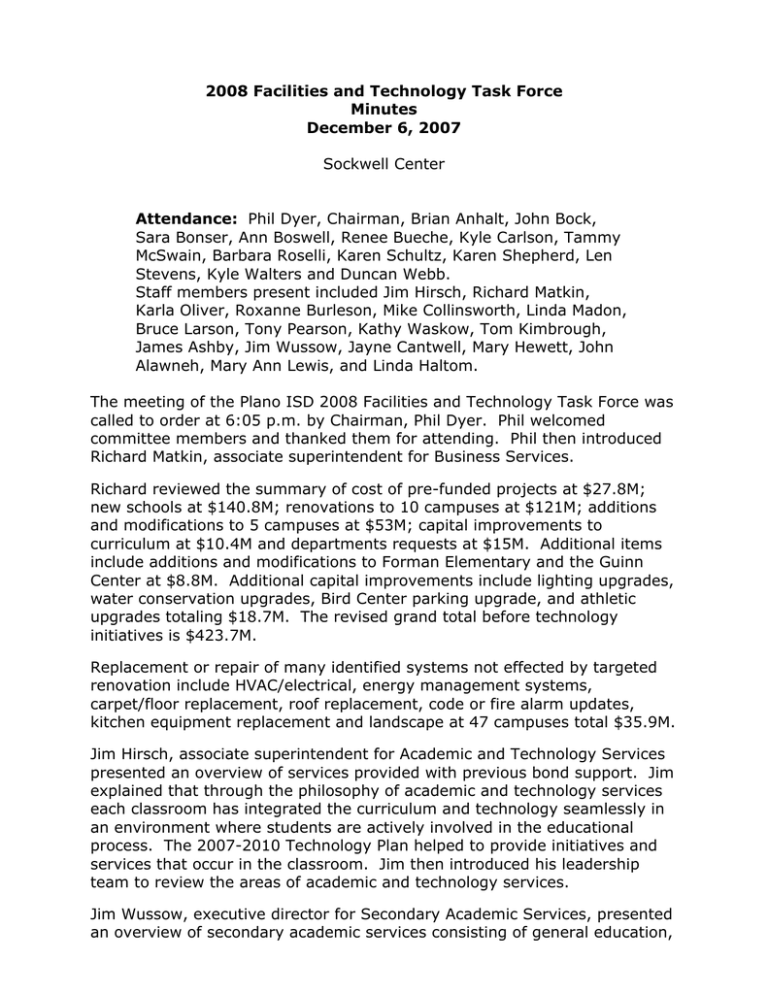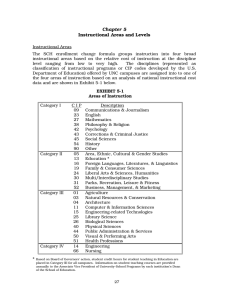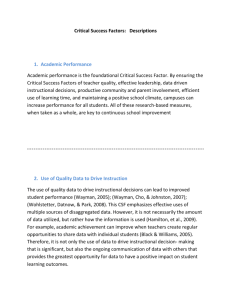2008 Facilities and Technology Task Force Minutes December 6, 2007 Attendance:
advertisement

2008 Facilities and Technology Task Force Minutes December 6, 2007 Sockwell Center Attendance: Phil Dyer, Chairman, Brian Anhalt, John Bock, Sara Bonser, Ann Boswell, Renee Bueche, Kyle Carlson, Tammy McSwain, Barbara Roselli, Karen Schultz, Karen Shepherd, Len Stevens, Kyle Walters and Duncan Webb. Staff members present included Jim Hirsch, Richard Matkin, Karla Oliver, Roxanne Burleson, Mike Collinsworth, Linda Madon, Bruce Larson, Tony Pearson, Kathy Waskow, Tom Kimbrough, James Ashby, Jim Wussow, Jayne Cantwell, Mary Hewett, John Alawneh, Mary Ann Lewis, and Linda Haltom. The meeting of the Plano ISD 2008 Facilities and Technology Task Force was called to order at 6:05 p.m. by Chairman, Phil Dyer. Phil welcomed committee members and thanked them for attending. Phil then introduced Richard Matkin, associate superintendent for Business Services. Richard reviewed the summary of cost of pre-funded projects at $27.8M; new schools at $140.8M; renovations to 10 campuses at $121M; additions and modifications to 5 campuses at $53M; capital improvements to curriculum at $10.4M and departments requests at $15M. Additional items include additions and modifications to Forman Elementary and the Guinn Center at $8.8M. Additional capital improvements include lighting upgrades, water conservation upgrades, Bird Center parking upgrade, and athletic upgrades totaling $18.7M. The revised grand total before technology initiatives is $423.7M. Replacement or repair of many identified systems not effected by targeted renovation include HVAC/electrical, energy management systems, carpet/floor replacement, roof replacement, code or fire alarm updates, kitchen equipment replacement and landscape at 47 campuses total $35.9M. Jim Hirsch, associate superintendent for Academic and Technology Services presented an overview of services provided with previous bond support. Jim explained that through the philosophy of academic and technology services each classroom has integrated the curriculum and technology seamlessly in an environment where students are actively involved in the educational process. The 2007-2010 Technology Plan helped to provide initiatives and services that occur in the classroom. Jim then introduced his leadership team to review the areas of academic and technology services. Jim Wussow, executive director for Secondary Academic Services, presented an overview of secondary academic services consisting of general education, gifted and talented education, AP/IB, AVID, fine arts and professional learning. For the 26,000 secondary level students, more than 180 courses are available. Classroom standards have been implemented with technology tools. In the foreign language classrooms, a digital drop-down language lab allows students ease in participation. Labs in the music theory classes help to deliver instruction. Investment in musical instruments has benefited students. Jayne Cantwell, executive director for Elementary Academic Services, presented an overview of elementary academic services which consists of elementary general education, early childhood education, special education for grades K – 12, multilingual education in grades K – 12, and federal programs. Software programs such as Destination Reading and Math which was purchased with bond funds have made a large impact in the educational process. Instruction for students who receive special education services are individualized. Multilingual programs which effect 6300 students from 96 countries speaking 94 languages are able to focus on students’ needs. James Ashby, director for Assessment and Accountability, outlined the department’s responsibility of overseeing all testing in the district and statistical analyses of collected data. The data that is collected helps to set priorities for instructional decision-making, allocating system resources, and setting accountability goals. With the move toward online testing, the use of technology will become more valuable to evaluate the data. Mary Hewett, executive director for Instructional Technology, presented the overview of instructional technology services consisting of support to over 4000 classrooms, 1125 campus and district software applications, library media and online services, career and technical education, student records and project management. Campus technology assistants maintain inventory of all technology equipment. Programs such as Computers @ Home which has put surplus technology equipment in the homes of 4000 families that qualify are supported by the instructional technology department. With the work of the instructional technology department, each classroom has a standard configuration to optimize the educational learning environment. John Alawneh, executive director for Technology Operations, presented an overview of technology operations in the district. John emphasized the reliability and solid structure of the infrastructure that the previous bond funds have provided. It has been a solid investment for the students, staff and the community. The meeting was adjourned at 7:25 p.m. The next meeting of the Facilities and Technology Task Force will be held Thursday, January 10, 6:00 p.m., at Sockwell Center.


